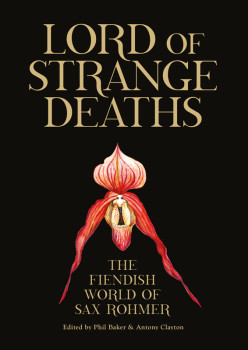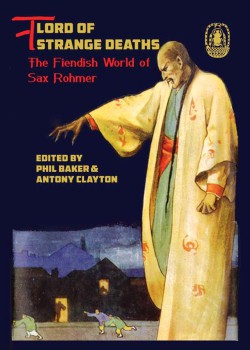Approbation and Obloquies for the Lord of Strange Deaths

 It is not easy to be a fan of classic pulp fiction and a person of good conscience in the 21st Century. It is far easier to embrace steam punk and all that has followed in its wake which treats the past as if it had the mores and indeed the colloquialisms of the present. As it is, one never knows when the Thought Police, those self-appointed guardians of right thinking, will decide a Dashiell Hammett is no longer possessed of literary merit because he also threw around racial slurs that were common in his day and didn’t have the foresight to have an enlightened view of sexuality when it came to capturing the world he lived in and wrote about.
It is not easy to be a fan of classic pulp fiction and a person of good conscience in the 21st Century. It is far easier to embrace steam punk and all that has followed in its wake which treats the past as if it had the mores and indeed the colloquialisms of the present. As it is, one never knows when the Thought Police, those self-appointed guardians of right thinking, will decide a Dashiell Hammett is no longer possessed of literary merit because he also threw around racial slurs that were common in his day and didn’t have the foresight to have an enlightened view of sexuality when it came to capturing the world he lived in and wrote about.
So what does this have to do with Sax Rohmer? Actually quite a lot. After a two year delay, Strange Attractor Press has finally published Lord of Strange Deaths, their impressive critical study of the man and his works. Such a tome was long overdue and very welcome indeed. Many of the individual essays are excellent and display the insight and level of research one expects from academics. Sadly, the book comes from the second decade of the current century which means one has to be reminded over and over that Sax Rohmer was a very bad person. He lived in colonial times and exploited the fears of the Boxer Uprising to create a criminal genius who heralded from China.
It doesn’t matter that Professor Moriarty and Dr. Nikola were his literary ancestors, they weren’t Chinese. It doesn’t matter that Fu Manchu was imbued with his author’s own socio-political views; was portrayed as well-educated, honorable, and anything but the leering racist stereotype spewing pidgin English found elsewhere (including movie and comic adaptations of Rohmer’s work). It doesn’t matter that Rohmer didn’t take a condemnatory view of Chinese people as a whole in his portrayal of an international secret society that had Eastern and Western members. It doesn’t matter that the series’ formula was predicated on a positive view of interracial romance and promoted multi-culturalism at a time when the concept did not exist. All that matters is Rohmer was a product of colonial times and created a villain who was Chinese and that is enough to make him unacceptable because he engenders liberal guilt.
It is possible that one day, in the future, people may look back at our attempts at political correctness and suggest that it was equally offensive to suggest a non-Caucasian cannot be portrayed as a criminal genius for fear that someone would somehow conclude it suggests the entire ethnic group is comprised solely of criminal geniuses. If one can accept that the current fashion means just such a disclaimer must be repeated as if a mantra so we’re sure we don’t mistake the literary critics appraising the work are possessed of racist views that were typical of imperialist England during the Edwardian era, then you’ll probably be able to look beyond such trivialities and appreciate all the book does hold.

 A more satisfying and focused read than Sir Christopher Frayling’s recent The Yellow Peril (2014), the new collection is the first effort to treat Rohmer as a serious subject, albeit only as an example of how offensive such fiction truly was and any enjoyment of the same will of course be denied in the interest of good taste. Co-editor Phil Baker has two contributions in the book. The first is an introductory piece filled with warnings and condemnations of what will follow just in case the individual who paid for this rather pricey tome on Sax Rohmer has never actually heard of him or his work and might get the wrong impression. The second piece is a quite useful study of the importance of London in Rohmer’s work and how life imitated art. This piece was one of several that harkened back to the heyday of The Rohmer Review, the amateur literary publication of The Sax Rohmer Society from the late 1960s through the early 1980s. The online successor to The Rohmer Review is The Page of Fu Manchu and its editor, Dr. Lawrence Knapp here contributes a wonderful piece debunking Rohmer’s claims that his friend Harry Houdini helped him solve a mystery that stumped the author while writing one of his thrillers.
A more satisfying and focused read than Sir Christopher Frayling’s recent The Yellow Peril (2014), the new collection is the first effort to treat Rohmer as a serious subject, albeit only as an example of how offensive such fiction truly was and any enjoyment of the same will of course be denied in the interest of good taste. Co-editor Phil Baker has two contributions in the book. The first is an introductory piece filled with warnings and condemnations of what will follow just in case the individual who paid for this rather pricey tome on Sax Rohmer has never actually heard of him or his work and might get the wrong impression. The second piece is a quite useful study of the importance of London in Rohmer’s work and how life imitated art. This piece was one of several that harkened back to the heyday of The Rohmer Review, the amateur literary publication of The Sax Rohmer Society from the late 1960s through the early 1980s. The online successor to The Rohmer Review is The Page of Fu Manchu and its editor, Dr. Lawrence Knapp here contributes a wonderful piece debunking Rohmer’s claims that his friend Harry Houdini helped him solve a mystery that stumped the author while writing one of his thrillers.
It is worth noting that quite a bit of space is spent documenting that Rohmer was a storyteller in every sense of the word. An intensely private man, he fictionalized so much of his life in interviews and articles that the sole biographical source, Master of Villainy (1972) penned by his widow with his protégé, Cay Van Ash is frequently of doubtful veracity given the many tall tales they chose to repeat for posterity. That said, Phil Baker’s co-editor, Anthony Clayton here contributes an excellent biographical sketch and literary survey of the author as the concluding piece. The other highlights of the volume are Roger Luckhurst and Robert Irvin’s essays on Rohmer’s fascination with Egypt and Arabian Nights, respectively; Kim Newman’s survey of the Fu Manchu series; and Paul French’s piece on Fu Manchu’s femme fatale daughter. The true standouts though are Gary Lachman’s essay on Rohmer’s interest in the occult and Mark Valentine’s piece on Rohmer and theosophy. These two contributions were so good one wished the authors had been afforded an even greater word count.
Sir Christopher Frayling himself turns up with a piece on Rohmer’s Music Hall background that is more focused and insightful than anything in his book on Rohmer published last year. The biggest disappointment in the collection is Alan Moore’s brief look at Fu Manchu’s place in his The League of Extraordinary Gentlemen. Given Moore’s intelligence, one would have hoped he had something more to contribute than a hastily-penned promotional piece. Several other essays are either too brief to register or appear to be truncated from one of the contributor’s own books and are only tangentially related to the subject. That said, if Ruth Mayer wins hands down with her academic study of the Yellow Peril with Serial Fu Manchu, then Strange Attractor Press deserve the highest accolades for finally delivering a literary study of Sax Rohmer over half a century after his death. Like Master of Villainy forty-three years ago, it will likely remain the only example of its kind and the single resource for students of pulp fiction and 20th Century pop culture to consult for many decades to come.
William Patrick Maynard was licensed by the Sax Rohmer Literary Estate to continue the Fu Manchu thrillers beginning with The Terror of Fu Manchu (2009; Black Coat Press) and The Destiny of Fu Manchu (2012; Black Coat Press). The Triumph of Fu Manchu is coming soon from Black Coat Press.
It certainly gets tiresome being lectured and scolded all the time, doesn’t it?
I think anybody who dismisses Hammet according to such criteria would be throwing out the baby with the bathwater. One lazy stereotype does not a bad writer make. However, I think it’s equally unrealistic to insist that such writers be immune from criticism. Even the best writers will reflect the prejudices of the day. Personally, I don’t regard this as a dealbreaker – ie, you just need to put such work in its proper historical context.
God save us from those who want to save us. A little knowledge is a dangerous thing, and the political correctors among us have a lot of it. I have to admit that I found myself flipping through Lord of Strange Deaths, looking for the contributions that didn’t hammer home the necessarily correct message. Many thanks for this honest and appreciative review. How dare our brilliant ancestors not have the self-righteous hot air that fills our presumptuous lungs.
I liked the Master of Kung Fu comic in seventh grade and fondly recall righteous arguments in the letter column about whether it was okay to have Fu Manchu for a character. Even then, it seemed like an argument better suited for the slow kids in grades 1-6, but dumb fun beats no fun.
Excellent post, Bill. So glad to see you carrying on. Looking forward to the next novel!